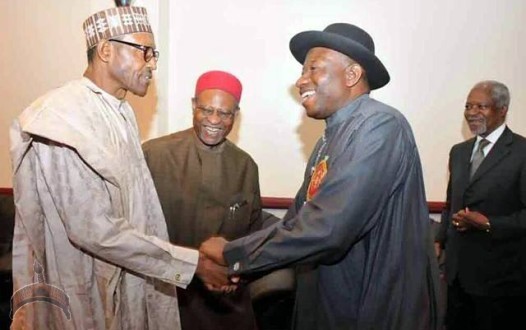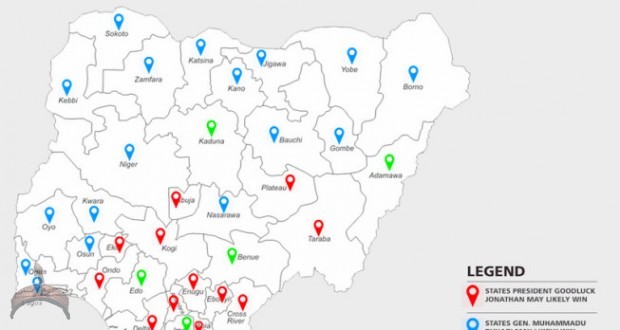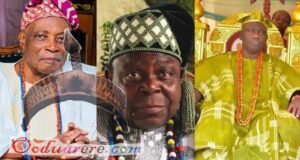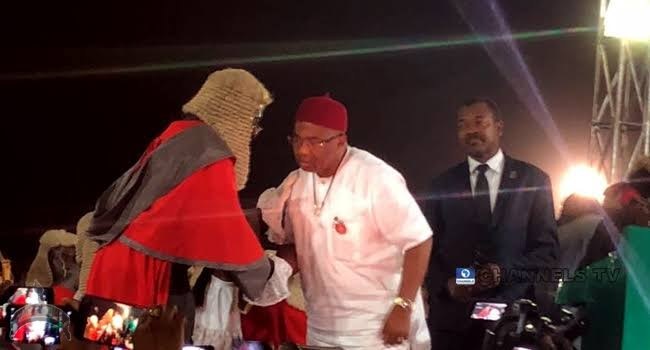Today’s presidential and national assembly election in Nigeria will most likely not be business as usual for Nigeria’s political elite and the electorate.
Although there are 14 presidential candidates in Saturday’s race, two of them namely, Goodluck Jonathan of the Peoples Democratic Party and Muhammadu Buhari, of the All Progressives Congress are the front runners. Both were also candidates in the 2011 poll.
Already, the passion exhibited by politicians and the robust campaigns of the two parties showed that Nigeria has moved towards democratic sustainability.
While the two major political parties went about the country selling their candidates to the electorate, one thing stood out in the campaigns – the political class is greatly averse to military intervention. They all believe in democracy and they want to nurture it.
But some of their actions betray the very essence of democracy. For instance, the campaigns by the PDP and the APC have been everything but civil. Political actors from the two camps were guilty of many things including amplification of hate speech, undue manipulation of religious sentiments and crude propaganda.
But who wins Saturday’s contest, the fifth since the restoration of democracy in Nigeria in 1999? Ibanga Isine and Festus Owete assess the chances of the PDP and APC candidates in the 36 states and Abuja, the nation’s capital.

President Goodluck Jonathan and General Muhammadu Buhari shaking hands at the 2015 Elections Sensitization Workshop on Non-Violence in Abuja today, organized by the Office of the National Security Adviser and SA to Mr. President on inter-party affairs.
SOUTH-SOUTH
Akwa Ibom: In this state, which has a total of 1,587,566 eligible voters with PVCs, the PDP will most likely sweep the presidential poll but in the National Assembly elections, the APC may snatch some federal constituencies and a Senate seat. It would not be a smooth sail for Mr. Jonathan here even though the Governor, Godswill Akpabio, is one of PDP’s strongest and most influential vote canvassers. In 2011, the president trounced Mr. Buhari by 1.65 million votes to 5,348. However in recent times, the APC has made serious inroad into the oil-rich state to pose a formidable challenge to the PDP.
Rivers: This will be one of the major battlegrounds in the zone and Nigerians are praying that it does not explode in a bloody violence among the opposing political forces. The APC cannot clinch the presidential election and majority of seats in the two chambers of the National Assembly because of the overwhelming influence of top PDP chieftains in the state. Currently, the most important and most influential political figure in the APC in the state is Governor Rotimi Amaechi. Just last Sunday, his Deputy, Tele Ikuru, defected back to the PDP and joined the swelling ranks of rich, influential and crowd-pulling members of the party including former Governor, Peter Odili; former governor, Celestine Omehia; two former deputy speakers of the House of Representatives, Chibudum Nwuche and Austin Okpara; former Minister of Transport, Abiye Sekibo; and former Minister of State for Education, Nyeso Nwike; who is the party’s gubernatorial flag bearer, among others.
With the political bigwigs in the PDP and their strong supporters, it might be difficult for the APC to take the state but Mr. Amaechi, a dogged politician, seems set to overwhelm all forces arraigned against his party to emerge victorious. In the presidential election, Mr. Jonathan might get the most votes not only because he is an Ijaw man with strong links in the state but also because his wife, Patience, is an indigene of the state. There is also a possibility of violence in some parts of the state including Okrika, Port Harcourt, Obio/Akpor, Ikwerre and in many of the riverine communities. It is difficult to predict who emerges the governor of the state but Mr. Jonathan is most likely going to do well here.
Bayesla: This is Mr. Jonathan’s home state. It has always voted PDP and with 548, 585 PVC holders, the state will likely deliver the most votes to Mr. Jonathan while the National Assembly election will also favour the PDP. A former governor of the state, Timipre Sylva, who is also a senatorial candidate on APC platform, may help to swing some votes to the opposition.
Edo: The 1,230,566 PVC holders in the APC-controlled Edo State will be torn between regional loyalty and the sway of the comrade Governor, Adams Oshiomhole, who is one of the pillars of the APC. Since the gubernatorial election will not be conducted in the state, Mr. Oshiomhole, who had fraternized with Mr. Jonathan especially during his first term in office, will find it difficult to stop the flow of votes to the PDP presidential candidate. At the end of the poll, the APC presidential candidate will most likely share the spoils with the President. Mr. Jonathan’s national campaign adviser, Tony Anenih, also known as “Mr. Fix It”, who though has been demystified by the “bulldozing” Mr. Oshimohole will definitely influence some votes to the president, especially in his Esan land. But so also will Mr. Oshiomhole and the APC National Chairman, John Oyegun, do so for Mr. Buhari.
Delta: This is another fertile area for the PDP. Since 1999, the state has largely been controlled by the PDP and with the influence of some very rich ex-militants; there is a possibility that the APC may not get up to 40 per cent of the 1,939,952 of the electorate with PVC. The National Assembly elections may also favour the ruling party.
Cross River: It has never really gone the way of the opposition and still might not this time around. Although some of the PDP big shots were angry over the emergence of some of the candidates in the state, there is no way the few strong element outside the ruling party can change the voting pattern which has always favoured the party in power. So, with the 983,968 PVC holders, there is a possibility that 70 per cent of the presidential election votes will go to Mr. Jonathan while the PDP will clinch majority of seats in the National Assembly poll. The opposition parties in the state may take one or two seats in the House of Representatives but this is just a probability.
SOUTH EAST
Imo: The state with the highest number of PVC holders in the zone is Imo which is controlled by Governor Rochas Okorocha of the APC. Although Mr. Okorocha is governor, the election may be a bit difficult for his party because many of those who supported and brought him to power in 2011 have returned to the PDP. Besides, the All Progressives Grand Alliance under which Mr. Okorocha won the election would not have taken the state if not for the influence of the aggrieved PDP members who at that time defected to the party. Another factor that played against the then incumbent and PDP flag bearer, Ikedi Ohakim, was the animosity he attracted when his aides were reported to have beaten up a Catholic priest. In the South East, the Catholic and Anglican churches play major roles in who becomes anything. Therefore, when Mr. Ohakim attracted the wrath of the church, he never recovered from it. Mr. Okorocha’s aides have recently been accused of invading the Maria Assumpta Catholic Cathedral and disrupting a debate which was organised for candidates of political parties in the state. For doing that, the churches in Imo State may turn their backs against the governor and his party. This state is difficult to predict electorally, but it will sure be a tough contest between Mr. Jonathan and Mr. Buhari. Pundits believe Mr. Jonathan may prevail here, but this is currently an APC state, and there is no way the opposition party will not give the PDP a run for its money here, although the zone is dominated by the PDP.
Abia: This state, with a total of 1,183,127 PVC holders will deliver more votes to the PDP in both the presidential and National Assembly elections. Mr. Jonathan will win here not only because it is a PDP stronghold, but also because his wife’s is maternally from Abia. However, the influence of a former governor of the state, Orji Uzor Kalu, cannot be underestimated. Yet, Abians may want to vote their son, Chekwas Okorie, who is the candidate of the United Progressives Party.
Anambra: Although, Anambra is controlled by the All Progressives Grand Alliance, it will vote PDP in the presidential election. The ruling party has since adopted Mr. Jonathan as its presidential candidate. Former Governor and Senator, Chris Ngige of the APC is facing a huge obstacle returning to the National Assembly because his popularity appears to have waned. Mr. Ngige is not known for sharing the “dividends” of democracy and his people may not give him the type of support he got when he contested against former Minister of Information, late Dora Akinyuli. APGA may take a few seats in the House of Representatives but it will be difficult for its national leader, Victor Umeh, to win a seat in the Senate.
Enugu: Enugu State is another stronghold of the PDP and the scenario this time around will not be anything different. Majority of the 1,223,606 PVC holders in the state will vote for President Jonathan with Mr. Buhari trailing behind. The same thing will play out in the National Assembly and the governorship election. But there is possibility of the opposition parties taking one or two seats in the National Assembly.
Ebonyi: This the smallest state in the South East and has a total of 848,392 PVC holders. Based on the outcome of past elections, the people of the state have always voted for the party at the centre and that will not change this time around. Although, the state governor, Martin Elechi, is reportedly romancing with the Labour Party, the state may vote Mr. Jonathan, especially given the influence and structure of the Secretary to the Government of the Federation, Anyim Pius Anyim and former Governor Sam Egwu.
SOUTH WEST
Lagos: The nation’s commercial nerve centre has always been in the kitty of the opposition. However, the ruling PDP is battling to dislodge the APC here this time. Though an opposition state, Mr. Jonathan emerged tops in Lagos in 2011 with over 1.2 million votes to Mr. Buhari’s paltry 189,983 and Ribadu’s 427,203 votes. There are 3,799,274 PVCs carriers out of 5.022,297 registered voters. The former military strongman, this time, may emerge tops. The APC leader and former governor, Bola Tinubu, joined by other political gladiators in Eko will deliver the state to Mr. Buhari. The APC is also certain to win over 90 per cent of the National Assembly seats.
Osun: This is APC stronghold and will go the way of the APC candidate despite the “rampaging” PDP. The APC will also take most of the legislative seats. A total of 1,125,657 people have their PVCs here.
Oyo: Until 2011, Oyo State was a PDP state. It fell into the hands of the PDP in 2003 when the party dislodged the AD but returned to the opposition in 2011. In that year’s presidential poll, Mr. Jonathan defeated Mr. Buhari and others. That may not be the case again. The Accord Party will certainly give the APC and PDP a hot chase in the National Assembly election.
Ekiti: Here, Governor Ayo Fayose badly wants to swing victory for Mr. Jonathan. However, the APC structure is still alive even though it lost power to Mr. Fayose’s PDP just a few months ago. It has been selling its presidential flag-bearer as a South-West consensus candidate. With three former governors and other top politicians in the APC, Mr. Buhari may make an appreciable impact here. The National Assembly election will also be a tough contest between the two parties. There are 522,107 PVC holders here.
Ondo: Governor Olusegun Mimiko is battling to take the entire state to the PDP in this election. However, the defection of his deputy to the APC a few days ago is a major setback for the governor, who himself dumped LP some months earlier. The two main parties may run neck to neck here both in the presidential and the National Assembly elections. There are 1.1 million PVC holders here.
Ogun: This state, with 1,125,657 holders of PVCs is also a battle ground for APC and PDP, but Mr. Buhari will carry the day. This is the home state of former President Olusegun Obasanjo who has ceaselessly criticised Mr. Jonathan for non-performance. The APC is sure to pick more of the legislative seats today.
NORTH CENTRAL
Benue: Elections in Benue State have always gone the way of the ruling PDP but with the defection of many top PDP chieftains to the APC, the tide may turn. With a total of 1, 607, 800 PVC holders in the state, over 60 per cent of the presidential election votes will likely go to Mr. Jonathan. The National Assembly election will be hotly contested with the incumbent governor, Gabriel Suswam trying to wrest the Senate seat from the former PDP National Chairman, Barnabas Germade, now with the APC. Equally, former Governor and Senate Minority Leader, George Akume of the APC will retain his seat while David Mark will most likely retain his seat. Majority of seats in the House of Representatives election might go the way of the PDP. Places like Gboko, Kwande, Katsina Ala and other crisis prone areas of the state have been identified as potential flash points.
Kogi: This has been a PDP state since 2003. In Kogi State where a total of 926,013 prospective voters got their PVC, the presidential election will likely go to Mr. Jonathan but with a slight margin while the APC is certain to snatch a few seats from the PDP in the National Assembly poll.
Kwara: While the APC is in control of Kwara State which has a total of 889,067 PVC holders, the PDP will give the party a tough chase to get some of the National Assembly’s seat. But the presidential election will most likely the way of the APC. A former governor and now a senator, Bukola Saraki, of the APC is believed to be in full control of the political machinery here and he will use his influence to deliver the state to Mr. Buhari.
Nasarawa: This state is an APC stronghold and will likely remain so during this election. Mr. Buhari will likely take the presidential poll in the state with a slight margin against Mr. Jonathan of the PDP. But the National Assembly election will be shared almost 50/50 by the two major political parties.
Niger: The election in Niger State will likely favour Mr. Buhari partly because of the influence of two former Heads of State that are said to favour the opposition party. But Mr. Jonathan will still win over 30 per cent of the votes in the state. However, the governorship and the National Assembly election may be taken largely by the PDP.
Plateau: Plateau State has remained with the PDP since 1999 and may not go the way of the APC in this election. Mr. Jonathan will likely get over 60 per cent of the votes from the state while the National Assembly election will be largely taken by the ruling party. The APC will, however, take a few seats in areas dominated by Hausa/Fulani.
FCT Abuja: In spite of its large population, the Federal Capital Territory has only 569, 109 PVC holders and the votes will be split almost 50/50 between Mr. Jonathan and Mr. Buhari. The lone Senate seat for the territory will likely be retained by the PDP while most of the House of Representatives seats will also go the ruling party. The APC may spring a surprise to clinch one or two seats currently held by the PDP.
NORTH EAST
Bauchi: The state has the largest number of voters in the zone with a total of 1,967, 081 PVC holders. During the 2011 polls which later erupted in an orgy of violence, Mr. Buhari of the then Congress for Progressive Change was voted as the presidential election while Isa Yuguda of the PDP won at the gubernatorial poll. In this election, Mr. Buhari will most likely defeat his PDP counterpart, Mr. Jonathan, with a wide margin while the National Assembly election will be shared between the PDP and APC with the later having more. Another factor that will influence the voting pattern here is that the National Chairman of the PDP, Adamu Mu’azu hails from the state. The gubernatorial election in the state may likely go the PDP way because of the influence of the incumbent governor but the APC will give Mr. Yuguda a fight for the Government House.
Borno: Election in Borno State is a bit difficult to predict because of the pervasive humanitarian crisis in the area. It is also very difficult to understand how INEC distributed PVCs to almost the number of people it registered in the state even when hundreds of thousands of people have been displaced. Based on the commission’s data, a total of 1, 407,777 PVCs have been distributed in the war-weary state. Majority of the traumatized residents may vote for Mr. Buhari, whom they believe could help rid their area of Boko Haram insurgents. But some votes will go for Mr. Jonathan who has just recently pushed out the bloody militants except in Gwoza. The National Assembly election will largely go to the APC but PDP will take a reasonable number of seats.
Yobe: This north eastern state has always been a stronghold of the opposition. In the last four previous elections, the ANPP won the state in presidential, legislative and governorship elections. The pattern of voting by the people may not change. Ravaged by insurgency activities though recently liberated by the Nigeria military, Yobe has 1,099,970 registered voters though only 824,401 collected their PVCs. Going by the previous voting pattern, Mr. Buhari is expected to win in the state with a wide margin. It is believed that the protest votes against Mr. Jonathan may be borne out of the dissatisfaction with how the insurgency was initially handled in the states, where several people lost loved ones. In today’s election, more than 90 per cent of the National Assembly seat will go to the APC. Gladiators who are likely to influence votes include a three-time governor of the state and now a senator, Bukar Abba Ibrahim of the APC and a former Police Affairs Minister, Waziri Maina.
Gombe: Quite early in the current political dispensation, Gombe was in the hands of the opposition – ANPP, but was taken over by the PDP in 2003 with the emergence of Danjuma Goje as governor. The PDP has been ruling the state since then. However, the defection of Mr. Goje to the APC early in 2014 changed the political equation in the state. There are 1,120,,023 registered voters out of which 1,070,726 collected PVCs. Although a PDP state, Mr. Buhari is sure to go with the larger part of the votes while Mr. Jonathan will trail behind. The incumbent state governor who is running for a second term will help deliver votes to the president.
Taraba: Although a PDP state since 1999, the birth of the APC changed the face of politics in this state. Mr. Jonathan won the state in 2011 with Mr. Buhari trailing behind. The opposition has made serious inroad into the state and this is likely to affect the outcome of the election. A total of 1,270,889 out of 1,340,652 registered voters collected their PVCs. Of the figure, both frontline candidates may run neck to neck here. The parties will share the legislative seats but PDP may have the upper hand.
Adamawa: This is a state to watch today. In 2011, Mr. Jonathan garnered 508, 314 votes to Mr. Buhari’s 344,526. At that time, the state was a PDP stronghold but today, the APC is hotly chasing the ruling party. The defection of the impeached governor, Murtala Nyako to the APC in 2013 brought life to the opposition in the state until his deputy, Bala Ngilari of the PDP, took over the reins of power some months ago. To be sure, Adamawa is going to be a battle ground for the parties. What with former Vice President Atiku Abubakar and other power brokers in APC. However, the combination of Nuhu Ribadu, former governor Boni Haruna and few others will want to keep the state in PDP’s kitty. The PDP may also win more of the legislative seats. A total of 1,381,571 residents out of 1590,012 registered voters got their PVCs.
NORTH WEST
Katsina: Although ruled by the PDP, the people of Katsina will vote for their son, Mr. Buhari, who is from Daura town. The state has 2,827,943 registered voters but 2,620,096 collected PVCs.
Kano: The state with 4, 112, 039 PVC holders will go the way of Mr. Buhari just like it did in 2011. However, Mr. Jonathan may repeat his superlative performance. He had secured 440,666 votes to Mr. Buhari’s 1,624,543 votes. More of the National Assembly seats will go to the APC.
Kaduna: This is the political capital of the North and the home state of Vice President Namadi Sambo who is believed not to be enjoying strong support of the people. It has always been a PDP state and may not change. However, since the entry of former FCT Minister, Nasir El-Rufai into the governorship race on APC platform, the PDP has not remained the same. What however is certain is that Messrs Jonathan and Buhari will run neck to neck as it was in 2011 while the National Assembly election may go either way. Over 3.1 million people have PVCs here.
Kebbi: This is one of the three Caliphate states, the other being Sokoto and Zamfara. Although, it was in the hand of the opposition since 2007, it has been controlled by the PDP. Even so, Mr. Buhari of the CPC won the election here in 2011 beating Mr. Jonathan to the second place. The situation is not likely to change this time, what with the disunity in the state chapter of the PDP. The return of Adamu Aliero to the APC is believed to be a plus for the APC.
Sokoto: This sultanate state will be picked by the APC candidate while its National Assembly seats will be shared by the APC and the PDP. In 2011, it was won by Mr. Buhari who beat Mr. Jonathan with 540,769 to 309,057 votes. The defection of former Governor Attahiru Bafarawa appears not to be a challenge. Over two million people have PVCs.
Zamfara: This state with over 1.4 million PVC holders is an opposition stronghold since 1999 and has remained impregnable for the PDP. Mr. Buhari won here in 2011 and the voting pattern is not likely to change both in the presidential and legislative polls in favour of the PDP. Former Governor Ahmad Sani, the incumbent, Abdulaziz Yari, and other APC chieftains will work hard to keep the state in the kitty of the opposition.
Jigawa: Like the other north western states, though controlled by a strong PDP governor, Sule Lamido, Jigawa may be won by Mr. Buhari. Most of the 1.7 million PVC holders are likely to vote for the APC candidate.
 Ọmọ Oòduà Naija Gist | News From Nigeria | Entertainment gist Nigeria|Networking|News.. Visit for Nigeria breaking news , Nigerian Movies , Naija music , Jobs In Nigeria , Naija News , Nollywood, Gist and more
Ọmọ Oòduà Naija Gist | News From Nigeria | Entertainment gist Nigeria|Networking|News.. Visit for Nigeria breaking news , Nigerian Movies , Naija music , Jobs In Nigeria , Naija News , Nollywood, Gist and more











i dont see GEJ coming close to winnig in Plateau and Kaduna is definitely a GMB win
“: Presidential Election: How GMB, GEJ will fare in 36 States #NigeriaDecides – http://t.co/GnYMumsiRk http://t.co/WMvYoXYKU9”